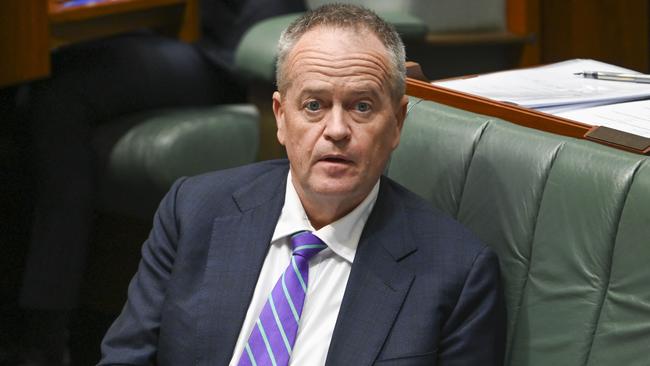New NDIS laws needed to stop claims for bird seed, cuddle therapy: Shorten
New NDIS legislation must be introduced to ensure the scheme pays only for disability-related supports, Bill Shorten says, pointing to previous claims for washing machines, bird seed and even crystal therapy.

Delaying the new NDIS legislation means taxpayers would continue to pay for crystal therapy, washing machines, birdseed, Wet’n’Wild tickets and even cuddle therapy, Bill Shorten warns.
Amid a fierce political battle over the timing of proposed reforms to the $42bn National Disability Insurance Scheme, the NDIS Minister said the current system suffered from too little scrutiny on what was being paid for – something that would be fixed if the new act was passed.
Mr Shorten said the existing law lacked clarity around what was considered a legitimate disability support, and every day the new legislation was delayed more payments would be made for the wrong things.
“The NDIS has to be reserved for disability-related supports,” Mr Shorten said. “Currently, NDIS dollars are going to crystal therapy, bariatric surgery, rent, washing machines, even birdseed and Wet’n’Wild tickets.
“We have organisations even promoting cuddle therapy to NDIS participants,” he said.
Mr Shorten said a threat by the Greens and the Coalition to delay a vote on the reforms until August 5 when parliament resumes after the winter break would cost the scheme $1.1bn, or $1m an hour.
He accused some members of a Senate committee reviewing the legislation of preferring to take a junket in Brazil than deal with the urgent matter.
The government is looking to the new laws to help arrest cost growth in the NDIS, with the federal budget having assumed future savings over the next decade of about $57bn through the planned changes to the scheme.
National cabinet has set a cost growth target of 8 per cent from 2026 instead of previously forecast 14 per cent annual increases.
Opposition NDIS spokesman Michael Sukkar said the legislative review process was being rushed and needed more time.
“The NDIS is far too important to rush, and participants, providers, stakeholders and carers must have their say,” he said.
Mr Shorten said there had already been ample opportunity for scrutiny, but some disability advocates disagreed.
“There is a strong view from members of the disability community that the bill should be delayed while genuine co-design around certain elements takes place, in particular embedding co-design in the legislation,” National Disability Services chief executive Laurie Leigh said.
Children and Young People with Disability Australia chief executive Skye Kakoschke-Moore said a delay would “provide time for the disability community to understand how other concurrent reforms may affect them on top of the changes to the NDIS Act.”
But Disability Advocacy Network Australia policy and advocacy director El Gibbs said the bill needed to be passed without delay. “We’re really keen to work with government on further amendments but are keen for reforms to progress,” Ms Gibbs said. “I have already given evidence to the committee three times.”
Mr Shorten was also adamant that future changes to the scheme beyond the current bill would require all disability providers to be registered, a key recommendation of the independent NDIS review that reported last year.
He told the National Summit on Neurological Conditions the current overwhelming use of unregistered providers meant the government was unclear in some cases who it was paying, or even if they were real.
It was not acceptable that 87 per cent of NDIS service providers were not registered, he said.
“We don’t know who we’re paying. We don’t even know if they’re real … and in some cases, they’re not chucking in invoices.”


